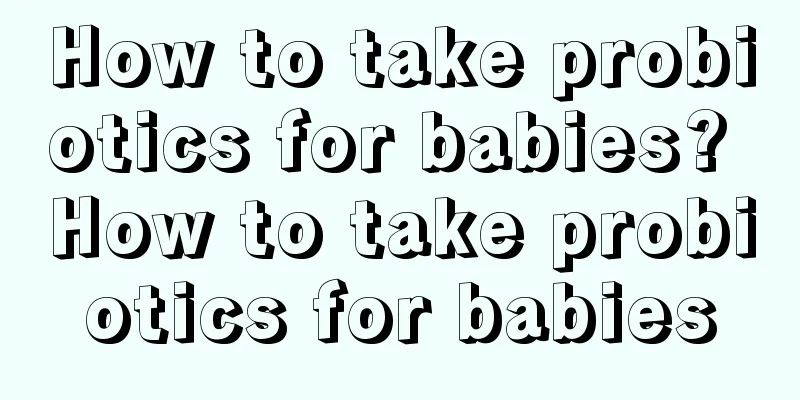Can babies eat yellow peaches? How can babies eat yellow peaches better?

|
Yellow peach is a very common fruit in our daily life. Many people like to eat yellow peaches. Yellow peaches taste sweet and delicious and are rich in nutritional value. Summer is the best season to eat yellow peaches. Can babies eat yellow peaches?Babies can of course eat yellow peaches, but this refers to babies who start to add complementary foods after six months of age. At first, they can only drink yellow peach juice or yellow peach porridge, and then eat fresh yellow peaches one by one as they grow up. Yellow peaches are mild in nature, sweet in taste, and rich in nutrients. They are rich in antioxidants, dietary fiber, iron, calcium, and a variety of trace elements, so it is very beneficial to feed babies with yellow peaches appropriately. How to eat yellow peach for babies1. Squeeze yellow peach juice If you want to feed your baby yellow peaches while he is eating complementary foods, it is best to squeeze some yellow peach juice for him to drink first. Specific steps: Wash the yellow peaches, peel and core them, cut the yellow peach pulp into small pieces, put them into a mixing container, pour in appropriate amount of cold boiled water and royal jelly, turn on the power, and blend into juice. 2. Yellow peach glutinous rice porridge Porridge is an indispensable ingredient when babies eat complementary foods, so yellow peach porridge is also very suitable for infants and young children. Specific steps: Wash the glutinous rice, wash the yellow peaches and cut them into small pieces, put water in the rice cooker, put in the glutinous rice, yellow peaches, and rock sugar, cook until the water boils, and simmer for 10 minutes. 3. Eat the pulp fresh When the baby's teeth have almost grown and start eating rice, he can eat fresh yellow peach flesh like adults. The mother can peel the yellow peaches, cut them into large pieces, and let the baby eat the flesh directly. This can also exercise the chewing ability of the baby's teeth. Precautions for babies to eat yellow peaches1. Pay attention to allergic reactions Some babies are allergic to yellow peaches, so when the baby eats yellow peaches for the first time, he should eat a little yellow peach first, and observe for two or three days to see if the baby has an allergic reaction. If there is no allergic reaction, the baby can continue to eat yellow peaches. If there is an allergic reaction, stop eating yellow peaches, and seek medical attention in time if the allergy is severe. 2. Do not eat too much Although yellow peaches are good, you can’t feed your baby too much. Too much will cause heat and internal heat. You can only feed one peach a day. Babies with internal heat constitution and prone to sores and boils should eat it with caution. 3. Some yellow peaches cannot be eaten Unripe yellow peaches cannot be given to babies, otherwise they will cause abdominal distension or carbuncle. Rotten or stale yellow peaches cannot be given to babies, and they must be washed before eating, otherwise there are more bacteria, which will cause gastrointestinal discomfort to babies. 4. Choose good yellow peaches Good yellow peaches are large, well-shaped, fresh in color, thin and easy to peel skin, white flesh, less crude fiber, and soft in texture. They taste juicy, sweet, less sour, and fragrant. 5. Pay attention to the food pairing of yellow peach Yellow peaches cannot be eaten with soft-shelled turtles. Not only will the nutritional value be reduced, but also symptoms such as getting angry and inflammation will occur. Yellow peaches cannot be eaten with plums. Eating them together will cause blood in the stool. Yellow peaches cannot be eaten with white wine, persimmons, seafood, radishes, citrus fruits, turtle meat, dog meat, etc. The benefits of eating yellow peaches in moderation1. Prevent and treat constipation Mothers all know that babies have fragile digestive systems and are particularly prone to constipation. Yellow peach pulp contains a large amount of pectin, which is a type of cellulose needed by the human body. It is easily absorbed and very helpful in treating and preventing constipation. Mothers can try giving their babies a yellow peach every day. 2. Produces body fluids and quenches thirst Yellow peach has the effect of moistening the throat, removing dryness, promoting salivation and quenching thirst. It is especially suitable for babies who always feel dry mouth and dry eyes in summer. In addition, babies with asthenia, cough, hernia pain, spontaneous sweating and night sweats can also eat some yellow peaches. 3. Promote appetite Yellow peach has its unique aroma and tastes delicious. In addition, yellow peach is rich in vitamins, carotene, and cellulose, which can help promote digestion. Therefore, it is very helpful for babies with poor appetite and can effectively promote appetite. 4. Improve immunity Yellow peaches are rich in nutrients, such as vitamins A, C, E, carotene, protein, dietary fiber, carbohydrates and trace elements. Eating them regularly can supplement nutrition, lower blood lipids and enhance immunity. |
>>: How to feed salmon to babies How to feed salmon to babies
Recommend
How to treat insufficient milk after childbirth? Five treatment methods for you to choose
The most embarrassing thing about feeding a baby ...
Do scented candles help you sleep? Which aromatherapy helps you sleep?
Aromatherapy candles are a very popular product n...
Can a newborn baby hiccup be left untreated? Can a newborn baby hiccup be treated with a tube?
It is normal for newborns to hiccup, because ther...
What should I do if my grades are not good? Will people with poor grades have no future?
Poor grades are a concern for every student study...
Can babies take a bath after vaccination? Mothers should pay attention
Babies need to receive various vaccines from birt...
Does having sex in late pregnancy help with childbirth? Does having sex in late pregnancy have any effect on the fetus?
Many happy and loving couples cannot control thei...
Why can't you get pregnant in winter? Pay attention to these 3 reasons
First, irregular work and rest schedules and poor...
How many months does it take for pregnant mothers to start taking calcium supplements? How to take calcium supplements in the early, middle and late stages of pregnancy?
Pregnant women are a very special group, and calc...
Does small breasts mean no milk? Is there a relationship between breast size and low milk production?
Many mothers worry about not having enough milk w...
What should pregnant women do if they have an emergency delivery at home? How to prevent emergency delivery
Premature labor can have an impact on both the mo...
What should pregnant women do if they have a stiff neck? Can pregnant women with a stiff neck use cupping?
Stiff neck is a common problem when we sleep. Gen...
What is the impact of high blood sugar in pregnant women on the fetus? What should pregnant women eat to lower blood sugar?
If pregnant women do not pay attention to the hea...
Can I eat watermelon during the dog days of summer? Is it good to eat watermelon during the dog days of summer?
Many women who have just given birth will spend t...
How to prepare Gerber Rice Cereal? How to prepare Gerber Rice Cereal in proportions
Many mothers are worried about domestic rice nood...
How much is a box of Buckyball? Low-priced Internet celebrity toys
The popular toy Buck Ball has risks, as it is eas...









